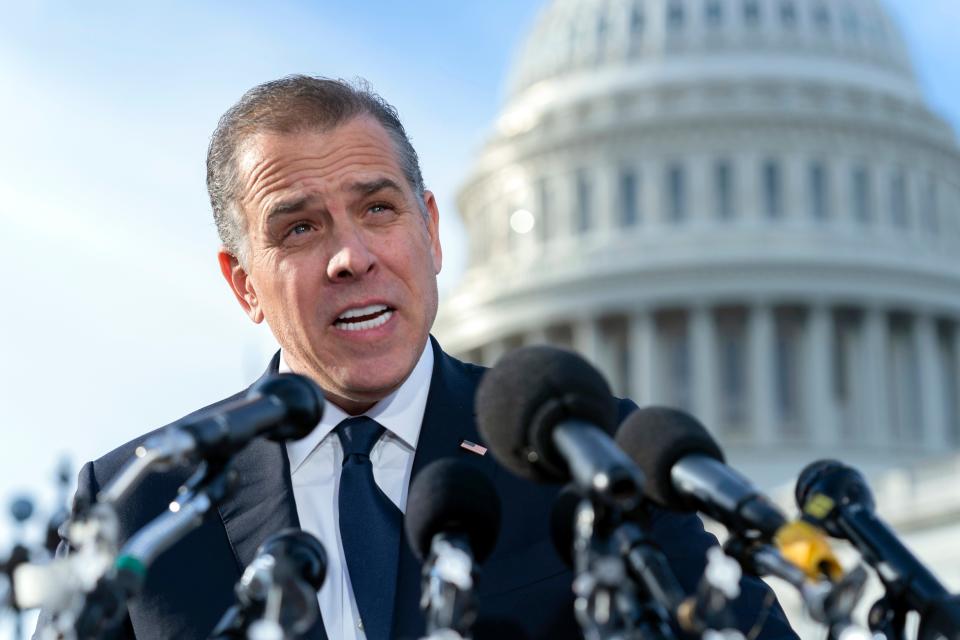Opinion: The rush to criminalize politics undermines us as a nation
- Oops!Something went wrong.Please try again later.
- Oops!Something went wrong.Please try again later.
- Oops!Something went wrong.Please try again later.
The indispensable line between politics and criminal justice in America is disintegrating. Politicians, pundits, and everyday people—from both sides of the tribal divide—increasingly want their political opponents prosecuted. Winning elections, legislative victories, and hearts and minds is no longer enough. Americans now long to see their fellow citizens behind bars. More and more, prosecutors oblige—bringing cases because of one’s political affiliation rather than one’s guilt or innocence.
This undermines not just the rule of law, but the nation as a whole.
President Joe Biden's son Hunter is embroiled in numerous criminal matters. And Republicans are doing their utmost to shoehorn Joe into the fray. Donald Trump, meanwhile, faces four separate indictments. And numerous politicians have been found guilty of committing crimes this century, including Scooter Libbey, Ted Stevens, Robert Coughlin, William Jefferson, Jesse Jackson Jr., David Petraeus, Michael Flynn and Steve Bannon.
Some of these cases represent legitimate law enforcement work. Some don’t. But the problem is much bigger than just actual cases. Trump’s 2016 campaign rallies saw thundering chants from the crowd to “lock her up,” referring to his Democratic opponent Hillary Clinton. While president, Trump openly pressured the DOJ to prosecute his political rivals, including Hillary Clinton, Biden, Barack Obama, James Comey and Andrew McCabe. Calls from Democrats to prosecute Trump and his loyalists, meanwhile, have been ubiquitous since 2016 (as have giddy celebrations when prosecutors do so).
While some cases are necessary to bring, the pervasive tribal lust to prosecute political rivals is very dangerous. First, mixing the criminal law with tribal passions makes defendants’ politics the focus, not their actual guilt or innocence. Second, criminalizing politics turbo-charges tribalism. Polarization’s knife has already penetrated deep inside the body politic. Criminalizing politics twists it violently. Finally, criminalizing politics deters talented people from serving the country. Just look at the presidency. Donald Trump was grossly unfit to hold America's highest office. His successor, Joe Biden, is a welcome reversion toward (but not quite to) the mean. Now in his eighties, Biden is neither what he once was nor the best American for the job. The House of Representatives, moreover, is throbbing with underqualified mediocrities. Americans shouldn’t further dissuade quality people from serving because imperfections or ambiguities in their past might be shoehorned into politically motivated criminal accusations.
It's also true, of course, that entering the government should neither absolve someone from past crimes nor authorize them to commit new ones. So how, then, should all of these competing concerns be balanced?
Several guiding principles must govern the analysis. For starters, the universal rules of criminal law must be honored. All defendants—irrespective of political affiliation—must be presumed innocent. And they should receive all the robust protections the law provides, including the constitutional right to confront their accusers.
Moreover, in determining whether a crime was committed the focus must be on the actions and not the actor. Prosecutors must perform objective, conscientious analysis regarding whether the admissible evidence meets each specific element in a criminal statute.

And, finally, prosecutors must recognize both their awesome power and their inherent fallibility. It’s a hazardous combination. As former Attorney General and Supreme Court Justice Robert Jackson said, “The prosecutor has more control over life, liberty, and reputation than any other person in America. His discretion is tremendous.” Yet despite this power, the prosecutor is just as vulnerable to tribalism, bias, and misjudgment as anyone else.
This particular expression of America's political dysfunction is more dangerous than most others. For criminalizing politics isn’t just unfair. And it doesn’t just destabilize the government. It’s the logical and inevitable precursor to something much worse. The last step before political violence is having the government eliminate political opponents for you by imprisoning them. And the first step after political violence is war.
Cooper is an attorney and the award-winning author of How America Works … And Why It Doesn't. This commentary appears exclusively in the American-Statesman.
This article originally appeared on Austin American-Statesman: Opinion: The rush to criminalize politics undermines us as a nation

